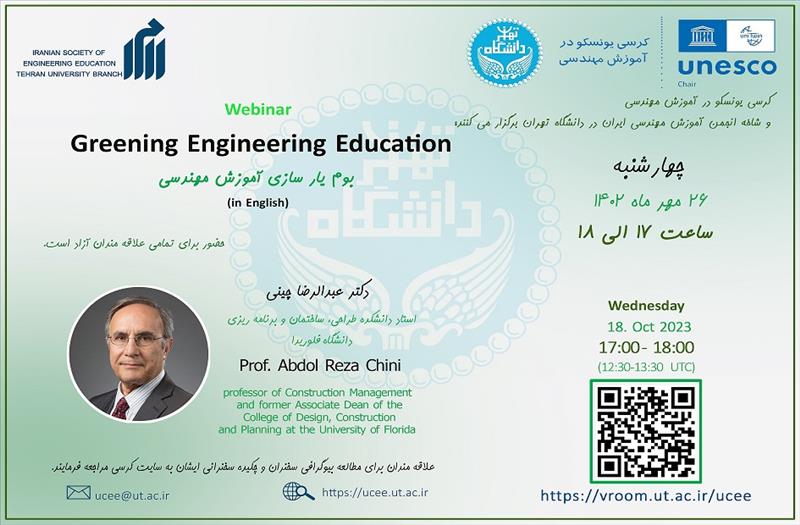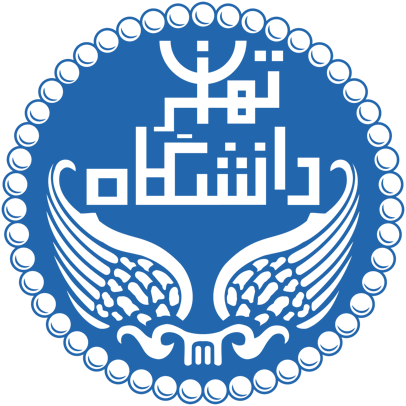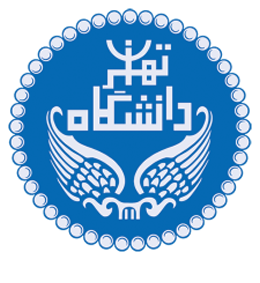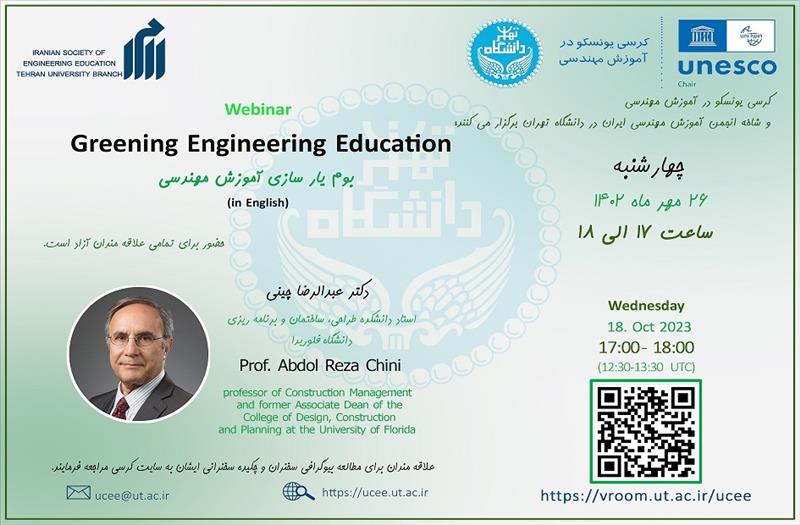وبینار: "بومیارسازی آموزشی مهندسی"؛ عبدالرضا چینى، 26 مهر 1402
سخنران: دکتر عبدالرضا چینی
عبدالرضا چینى در سال ١٣٥٠ به اخذ کارشناسىارشد در رشته راه و ساختمان دانشکده فنى دانشگاه تهران نائل آمد. پس از مدیریت چندین پروژۀ ساختمانى در استان فارس، در سال ١٣٦٠ براى ادامه تحصیل به امریکا رفت. وى در سال ١٣٦٢ مدرک کارشناسىارشد خود را از دانشگاه جرج واشنگتن و در سال ١٣٦٥ مدرک دکتراى خود را از دانشگاه مریلند دریافت کرد. بین سالهاى ١٣٦٥ تا ١٣٦٩ در ساختن پروژۀ متروى شهر واشنگتن شرکت کرد و از سال ١٣٦٩ به تدریس مدیریت ساختمان، ابتدا در دانشگاه مریلند و سپس در دانشگاه فلوریدا پرداخت. بهمدت هشت سال از ١٣٨٢ تا ١٣٩٠ ریاست بخش مدیریت ساختمان دانشگاه فلوریدا و از ١٣٩٥ تا ١٤٠١ معاونت آموزشى دانشکده طراحى، ساختمان و برنامهریزى این دانشگاه را بهعهده داشت. وى در سال ١٤٠٢ بازنشسته شد. ریاست کمیتۀ استاندارد شوراى تحصیلات ساختمان امریکا از ١٣٨٨ تا ١٣٩٩، بنیانگذار و هماهنگکنندۀ کمسیون مدیریت کاربرد مواد ساختمانى انجمن جهانى تحقیق و نوآورى از ١٣٨٩ تا ١٤٠٠، و مشاور تحصیلى بخش ساختمان دانشگاه پلىتکنیک هونگ کونگ از ١٣٨٥ تا ١٣٩١ از دیگر سمتهایى است که بهعهده داشته است. دکتر چینى مؤلف ١٥٠ مقاله تحقیقى و ویرایشگر هفت کتاب و نیز سخنران کلیدى در چندین کنفرانس بینالمللى است. وى در سال ١٣٩٥ بهعنوان استاد ممتاز بنیاد تحقیقى دانشگاه فلوریدا بخاطر تحقیقاتش در مورد بازیافت و دوباره به کاربرد مواد ساختمانى انتخاب شد. همچنین در سالگرد هفتادمین سال تأسیس دانشکده فنى دانشگاه تهران در سال ١٣٨٣ به عنوان یکى از هفتاد فارغالتحصیل ممتاز آن دانشکده انتخاب شد.

..
Abstract
Engineering is a bridge over which humankind passes into nature to understand it, control it, and guide it to its own field of interest and service. In the last two centuries and in parallel to the industrial revolution, engineers made significant contributions to the well-being of society elevating the standards of living and adding to the comforts of life through introducing new technologies. However, they didn’t pay proper attention to the negative side of scientific advancements such as contamination of water, degradation of soil, emissions in the air, and climate change. This presentation is about making good decisions by engineers to promote sustainability in the use of technology. Sustainability is the balanced pursuit of ecological health, social equity, and economic welfare. It is grounded in an ethical commitment to meet the needs of the present without compromising the ability of future generations to meet their own needs. The presentation starts with an overview of some of the most pressing challenges humankind faces today, followed by exploring the ecological dimension of the ethics of sustainability. Application of sustainable development in decision making for engineers and scientists are discussed and several strategies used to integrate sustainability in engineering education are explored. Several tools available to measure sustainability are discussed and examples of their use are provided. The education system has to make engineering students aware of the social, economic, and environmental effects of their chosen field and the technologies that they will develop
..
 ورود به حساب کاربری
ورود به حساب کاربری



